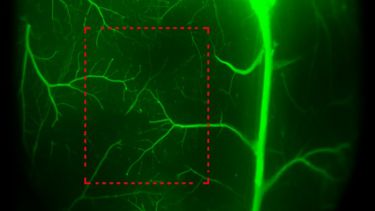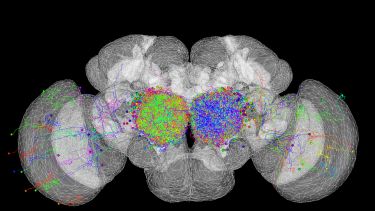Cognitive neuroscience and mental health
We have a strong track record of using cognitive neuroscience and mental health approaches to understand how the brain and nervous system functions. We combine advanced computational, neuroimaging and state-of-the-art research tools to investigate the function and dysfunction of the nervous system.

Our research
Our research includes expertise in developing new methods for acquiring, modelling, synthesising and interpreting neuroscience data. Our pre-clinical neuroimaging research uses a wide range of technologies to visualise brain structure and function.
We also use neuroimaging technologies to help us understand complex neurophysiological processes in health and disease, from research looking at individual cells to whole brain behaviour.
Thanks to our dedicated patient groups, our human and clinical neuroimaging research is shedding light on the normal function of the nervous system, addressing key questions in cognitive neuroscience, and investigating the changes that occur in a wide range of brain and sensory diseases.
Our expertise in neuroimaging and our world-leading research in modelling neural systems means we are in a strong position to take new discoveries through to clinical treatment.
A key focus of our pre-clinical research is to understand how blood flow is regulated in the brain in both health and disease, which has important implications for stroke and Alzheimer's disease.
Research groups
Our research groups are aligned to three main areas:
Pre-clinical neuroimaging
Our pre-clinical neuroimaging research uses a wide range of state-of-the-art technologies to visualise brain structure and function at a level of detail not possible in human subjects or patient populations.
Our principal research areas include:
- Neurovascular Function and Dysfunction – how are brain blood flow changes coupled to neuronal activity and changing metabolism?
- Neuroimaging in Cardiovascular Disease (NICAD Network) – our translational cross-disciplinary network of cardiovascular scientists and neuroscientists.
- Neurophysiological Basis of BOLD fMRI – we are investigating what functional brain imaging signals really tell us about changes in brain (neuronal) activity.
- Neuroimaging in Neurodegenerative Disease – we are investigating how neuroimaging tools might aid in disease diagnosis, staging and treatment evaluation.
- Pharmacological Neuroimaging Research – advancing the application of non-invasive neuroimaging techniques for neuropharmacological and drug-discovery research.
Human and clinical neuroimaging
With access to well-characterised clinical populations and a wide range of imaging modalities available, we are shedding light on normal brain function, addressing key questions in cognitive neuroscience, and investigating the changes that occur in a wide range of neurological diseases.
- Neuroradiology and Clinical MRI – this includes our 3T and 1.5T research MRI systems and a diverse portfoilio of research into CNS disorders including neurodegenerative diseases epilepsy, ataxia and stroke.
- Polarised Imaging Systems – advanced neuroimaging using hyperpolarised gases, in association with the University of Sheffield Pulmonary MR imaging Group (POLARIS).
- The EEG Research Group – addresses a wide range of questions in cognitive psychology and cognitive neuroscience using state-of-the-art electroencephalography systems.
- The Sheffield Autism Research Laboratory (ShARL) – we have an internationally renowned reputation in autism research which incorporates cognitive, psychophysical and EEG research tools.
- The Developmental Affective Neuroscience Laboratory brings together EEG and fMRI techniques to investigate the development of emotion and emotional regulation in the brain.
- The Translational Neuropsychology Group conducts research on the neuroscientific, clinical and behavioural aspects of neurodegenerative and neurological disorders.
Cognitive neuroscience and mental health
The University of Sheffield has a strong track record in the use of cognitive neuroscience and mental health approaches to understand how the brain functions.
Our cognitive neuroscience and mental health research includes groups within the Department of Computer Science as well as Sheffield Robotics, a national leader in robotics research.
In addition many of our researchers are active members of The INSIGNEO Institute for in silico Medicine, a major cross-disciplinary initiative with the Faculty of Engineering involving academic and clinical staff who collaborate to develop computer simulations of the human body and its disease processes.
- The Adaptive Behaviour Research Group (ABRG) and the Computational Neuroscience of Action Control laboratory undertake computational modelling of basal ganglia, decision-making and cognitive robotics research.
- The Basal Ganglia Systems Neuroscience Group uses approaches ranging from cellular recording in the brain slice to fMRI studies in human subjects to understand basal ganglia function and dysfunction.
- The Active Touch Laboratory uses behavioural, computational modelling and robotics approaches to investigate tactile sensing in animals, people and intelligent machines.
- Research in the Departments of Computer Science, and of Automatic Control and Systems Engineering are working on modelling the entire brains of invertebrates via two separate projects, Brains on Board and the Fruit Fly Observatory.
Our neuroinformatics research connects to the computational biology, bioinformatics and machine learning strengths under the Translational Neuroscience theme, as well as to the Centre for Computational Imaging & Simulation Technologies in Biomedicine (CISTIB).



